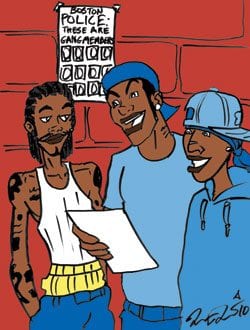
Shame is dead
Americans are obsessed with celebrity. Until the media focuses on them, it is enough for some people to be in the company of others who have already been discovered. The desire for their 15 minutes of fame is so strong that some people are willing to sacrifice their privacy and even their sense of shame.
Some of the women involved in Tiger Woods’ erotic exploits seemed all too eager to tell all, in time to make the six o’clock news. It is apparently no longer demeaning to be known as notorious — as long as the emphasis is on well known.
With Americans now willing to risk so much for celebrity, one wonders how the Boston police could believe that the distribution of flyers with the photos of gang members would shame them. In fact, that strategy probably had the opposite affect. The police inadvertently became the gang’s PR department.
It cannot be claimed, however, that the police violated the civil rights of those pictured on the flyer. Everyone is responsible for his choice of friends and associates. Although every person in the flyer might not actually be a member of the gang, the police believe they are because of the close association with known gang members. That is why attentive parents advise their children to be careful of the company they keep.
The police flyer strategy was inadvisable not because of civil rights violations, but because it afforded a degree of celebrity to a group that is undeserving of any fame.
The union wins; taxpayers lose
Last week the Boston City Council approved the firefighters’ contract that grants a raise of more than 17 percent for five years from 2006 to 2011. Firefighters will receive an average payment of $29,000 each for retroactive pay increases. The union fought hard for acceptance of their untimely wage demands.
During the negotiation period the bottom fell out of the economy. Americans are suffering from the worst economic decline since the Great Depression of the 1930s. Unemployment hovers at 10 percent, and is much higher for racial minorities. People are losing their homes. There were 7,563 mortgage foreclosures in Boston in 2007, which is three times the rate in 2006, nine times the rate in 2005, and the problem persists.
Fortunately, Mayor Tom Menino understood early on the financial crisis that Boston was facing. He has had to close some libraries, cut the school budget and lay off workers in other departments in order to meet the firefighters’ demands. That is not how it works in the private sector. At various times, unions in the auto, steel and airline industries have had to give back benefits in order for their companies to survive.
Unfortunately, the firefighters’ union has been able to convince the public that they are underpaid. That is not so. A firefighter with 10 years experience will earn $87,336 a year. Many citizens will insist that pay level is worth it because of the risks firefighters face. However, a sergeant first class in the US Army with 10 years experience has a base pay of less than half as much, $42,066. Whose life is more endangered, a firefighter in a station house or a soldier in Afghanistan?
The system of public workers’ unions is broken and must be fixed before the people’s coffers are bled dry.






